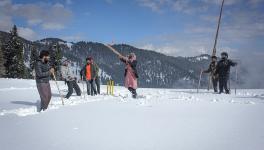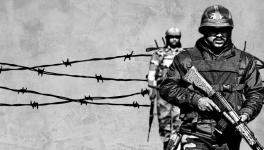Laws Still Protect Perpetrators of Sexual Violence in J&K, Can Kathua Change what Nirbhaya Couldn’t?

Image Courtesy: The Financial Express
After the infamous Nirbhaya gang rape of 2012, it is the Kathua rape case which has elicited the same level of public outrage – both nationally and internationally. Issues of women’s safety in India have come under spotlight once again after Kathua, only reinforcing the notion that the country is not safe for women. Internationally, travel advisors have time and again warned women that they should be cautious while traveling in or to the country. All this anger, media attention and criticism, which came three months after the incident, finally compelled the prime minister to condemn the crime, albeit meekly. But his statement, or the president’s stand mean little when we take a look at the situation of the home state of the Kathua victim – Jammu and Kashmir.
The problem is extensive in J&K. The data released recently in the legislative assembly showed that over 4,714 crime against women were registered last year alone in the state. Data from 1989 to 2013 shows that 5,125 cases of rapes have been registered in the state, out of which 2,601 were in Kashmir and 2,524 in Jammu. Also, 14,953 cases of molestations were registered in the same period – 12,215 in Kashmir and 2,738 in the Jammu province. Out of these, 70 rape cases and 55 molestation cases were against the armed forces. But as records show, the armed forces have not been punished for any of these cases.
In the aftermath of Nirbhaya, activists and citizens were hopeful that the incident would serve as a wake-up call and bring much needed changes to deal with such cases more effectively. While some changes did come in the form of the Criminal Law (Amendment) Act in 2013, certain important recommendations of the JS Verma committee, formed for the purpose of reforming laws that deal with sexual crimes, were ignored.
These include recognition of marital rape as a crime, and amendments to the Armed Forces (Special) Powers Act (AFSPA), amongst others. Currently, no case filed against armed forces can be taken cognisance of in a court, until prior sanction is given by the Centre. This is to ensure that the army does not face any criminal proceedings in incidents such as deaths or injuries that occur while they are acting in the “line of duty”. Cases of abuse of AFSPA are aplenty, but what is more shocking is the fact that allegations of sexual violence against the army cannot be taken to the court without the government’s sanction. The question that has remained unanswered so far, is how any incident of sexual violence can occur in the “line of duty”.
After the Nirbhaya case, a group of 50 women in Kashmir filed a Public Interest Litigation (PIL) to reopen investigations into the 1991 case of mass rapes in the twin villages of Kunan Poshpora in Kupwara district of Kashmir. At least 40 women were gang raped by army personnel, and the men of their families were tortured. All attempts to get justice by the victims had failed, until the case was reopened after multiple petitions four years ago.
The petitioners were hoping that the traction gained by the sexual violence in the case of Nirbhaya would help in bringing attention to the issues in the restive state of Jammu and Kashmir, and might result in some action in pending cases of harassment, rape and molestation, in the state. However, this did not happen, and little has changed in the state since then, where even crimes as heinous as rape by the armed forces are viewed as something that may have occurred in the “line of duty”.
Natasha Rather, one of the petitioners in the Kunan Poshpora case told Newsclick, “The case has been in the SC for the last three years. There is no urgency to dispose the case or at least let it proceed. And this delay is just part of the systematic denial of justice and the impunity to the Indian armed forces in Kashmir. Let’s understand Kathua from the same lens of impunity. Two SPOs are involved and the case seems to be about land grab and ousting the Gujjar community out. This case follows, if you look closely, the same pattern of systematic sexual violence as other cases in Kashmir.”
Kunan Poshpora is not the only such example from the state. In an area of conflict, sexual violence assumes additional purposes, and is employed as means of waging war. It becomes even harder for the victims to come out, speak, and lodge complaints, as they are aware of the systemic ways in which justice will be denied. Victims feel that the perpetrators – the members of the armed forces – have an upper hand, as they will be shielded by virtue of almost a free reign of power in the state. There are documented cases, where families have given testimonies to the human rights groups like Jammu Kashmir Coalition for Civil Society, but have not lodged any formal complaint fearing retaliation from the armed forces.
Despite this, as the data shows, there have been many cases, where the victims have stepped forward. The extent of the problem can be comprehended from the fact that even after many such incidents go unreported, the number of reported sexual offences remains high.
In the few cases, where complaints are lodged and investigations do proceed to the framing of chargesheets, things come to a standstill when the government sanction is sought. There are cases, where the government straight ahead denies sanctions to allow criminal proceedings; there are cases where response is still awaited; there are cases where the state government has lost track of the progress after requesting the sanctions and receiving no answer, and there are cases where the sanctions were not even sought.
To deny sanctions, the reasons often given by the Ministry of Defence defy any logic or grounds in the law. There are instances where cases have been dismissed based on the reason that the victim was married to a militant, so “the lady was forced to lodge a false allegation by anti-national elements.” The Kunan Poshpora case was also initially dismissed on similar grounds. Other times, the MoD has said that allegations are baseless and framed with “mala fide intention to put the army on defensive”. Mostly, the ministry states absence of prima facie evidence as grounds for denying sanctions.
In the rare occasion that a case does proceed to trial, it is by a court martial whose judgements tend to be heavily biased in favour of the armed forces. In any state, a crime committed by the armed forces against any civilian such as rape, will automatically be tried in a criminal court. But the jurisdiction of a criminal court does not apply in conflict areas, essentially denying residents of these areas any recourse to justice. This is clearly illustrated by the fact that no victim of sexual violence at the hands of armed forces in Kashmir has received a fair trial that culminated in a fair punishment.
The JS Verma committee recognised that no sanction should be required in cases of sexual offences, but that suggestion has been ignored till now. To try again and draw attention to the dire situation in the Valley, a campaign was launched on the portal One Billion Rising asking for international intervention by feminist and human rights groups, as well as the United Nations to address the problem of sexual violence and legalised impunity in Kashmir.
The campaign petition points out how Narendra Modi’s statement was ambiguous, and by saying “India’s daughters”, what seems to be implied is “the fact that the rapes and murders perpetrated by Indian armed forces on Kashmiri men and women—who do not consider themselves to be the sons and daughters of India—do not deserve justice.”
Although Chief Minister of J&K Mehbooba Mufti has made declarations of bringing in new laws that will award death penalty to those who rape minors (which is problematic on a whole another level), the fact remains that in Kashmir, cases hardly ever reach the stage of punishment. Until that is fixed, making the punishment harsher does not mean anything. When all the hue and cry over Nirbhaya could not result in any meaningful changes in Kashmir, where impunity continues to be granted to the armed forces, there is little hope that the end of the Kathua case will be any different.
Get the latest reports & analysis with people's perspective on Protests, movements & deep analytical videos, discussions of the current affairs in your Telegram app. Subscribe to NewsClick's Telegram channel & get Real-Time updates on stories, as they get published on our website.
























